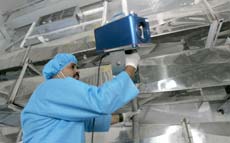|
Iran Scores Again in Nuclear Standoff
 |
|
Iranian
technicians in a control room supervise resumption of activities
at the Uranium Conversion Facility in
Isfahan
. (Reuters)
|
VIENNA,
August 10, 2005 (IslamOnline.net & News Agencies) – The deadlock
between Iran the UN atomic agency took a dramatic turn Wednesday,
August 10, as the nuclear watchdog appeared split on a draft
resolution on the Islamic republic and cancelled an emergency meeting
in the hope of reaching a diplomatic solution, while Tehran went a
step further by removing UN seals at a nuclear facility.
“It's
off,” International Atomic Energy Agency's (IAEA) spokesman Peter
Rickwood said about Wednesday's session of the board, which began
meeting Tuesday, August 9, adding that the diplomats “just need more
time,” reported Agence France-Presse (AFP).
The
IAEA 35-nation board of governors is expected to meet again Thursday,
August 11.
The
European Union, which has been negotiating with
Iran
on obtaining guarantees that the Iranians are not making nuclear
weapons, is trying to win approval for a draft resolution calling on
Iran
to reverse its decision to push ahead with nuclear fuel work.
A
diplomat close to the IAEA said non-aligned nations on the board “do
not want a resolution on
Iran
”, preferring instead the weaker option of a simple statement from
the board's chairman.
Iran
is not on the board but is a non-aligned country.
But,
the diplomat said, Western countries “feel the credibility of the
board is at stake because Iran has ignored so many of the board's
resolutions,” including ones last September and November calling on
Iran not to make nuclear fuel, which powers civilian reactors but can
also be used to make atom bombs.
The
prospect of the talks succeeding has been dealt a severe blow by
Iran
's resumption of conversion Monday, August 8.
Throughout
the current escalation of tensions
Iran
has been at pains to emphasize it was resuming conversion activities
in concert with the IAEA, whose inspectors have installed surveillance
equipment to monitor the process.
Breaking
Seals
 |
|
An
IAEA inspector installs camera in Isfahan Uranium Conversion
Facility. (Reuters)
|
Iran
, meanwhile, raised the stakes in the standoff with the international
community and removed Wednesday seals placed by the UN nuclear
watchdog at the Uranium Conversion Facility in
Isfahan
, allowing the facility to return to full capacity.
“We
have started,”
Iran
's atomic energy agency vice-president Mohammad Saidi told AFP. “It
is happening under the supervision of the Agency.”
The
IAEA “told us in a letter that there was no obstacle and that (the
agency) authorizes us to remove the seals, which will be
returned to them afterwards,” he said.
While
it was Iranian workers who removed the seals, the process has taken
place under IAEA supervision. Mindful of playing by international
rules,
Iran
waited for the agency to finish installing surveillance equipment
before breaking the seals.
“The
seals are in the process of being cut. Once the removal of the seals
is completed we will confirm this to the (IAEA) board,” IAEA
spokeswoman Melissa Fleming told AFP earlier in
Vienna
.
Conversion
turns uranium ore, or yellowcake, into the feed gas for enriching
uranium.
Iranian
President Mahmoud Ahmadinejad has expressed a willingness to resume
negotiations with
Europe
, which have been teetering on the brink of collapse.
The
Iranian student agency ISNA quoted Ahmadinejad as telling UN chief
Kofi Annan in a telephone conversation late Monday that
Tehran
was prepared to resume talks, albeit with “new propositions” to be
unveiled shortly.
But
the Iranian leader described a European offer of nuclear, commercial
and political cooperation in exchange for
Iran
renouncing ultra-sensitive nuclear activities as an “insult to the
Iranian people.”
The
best guarantee that
Iran
's nuclear program is peaceful was the “infallible watching of the
IAEA cameras,” he said. “I hope that the Europeans will also
accept this reality.”
In
Vienna
, Iranian negotiator Cyrus Nasseri said
Iran
was “prepared to continue negotiations with the EU-3 as long as
there are no preconditions” and the talks are in “good faith.”
Nasseri
said Iran was “frustrated” that the EU-3 were still not
acknowledging what Iran considers its right under the Non
Proliferation Treaty (NPT) to make nuclear fuel as part of a peaceful
atomic program.
|